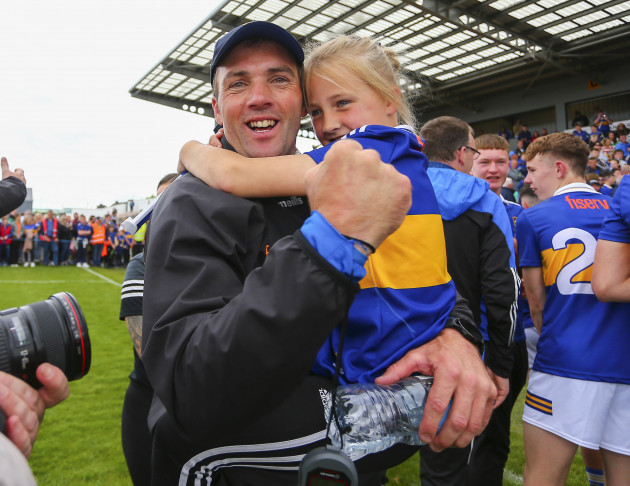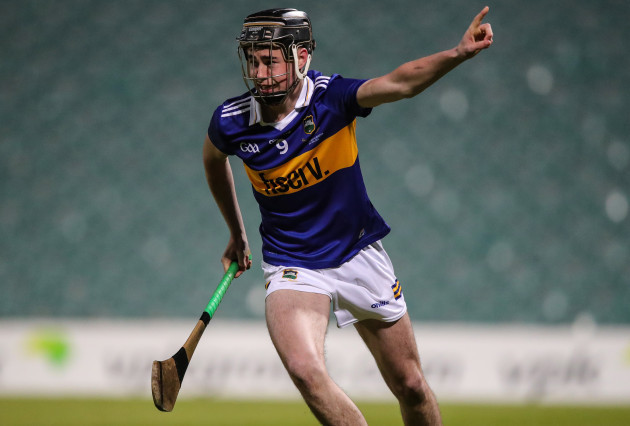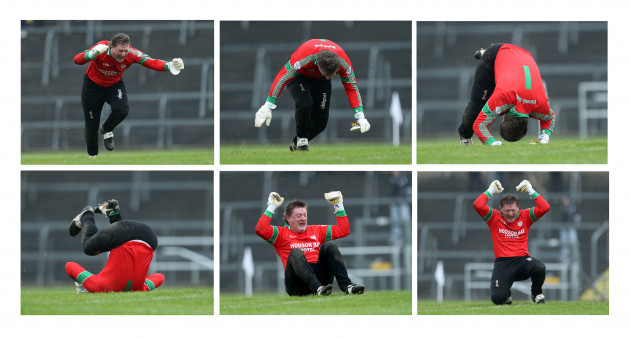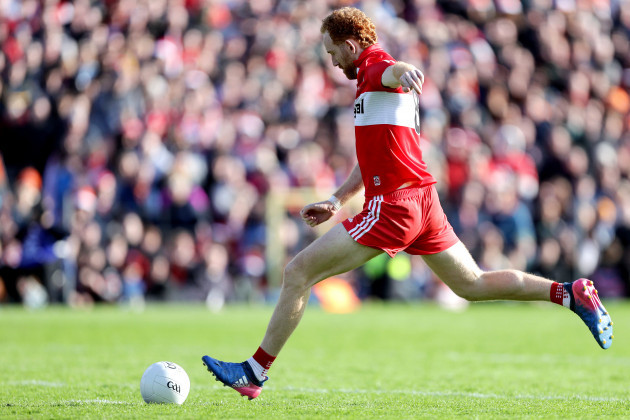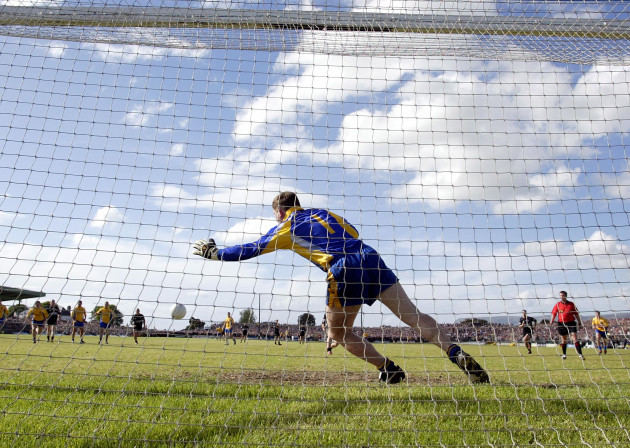IT’S A LOTTERY.
Penalties. Marvellous, hmmm?
Top bins. Off the stanchion. Kiss off the post. In-off the crossbar. Smashed straight down the middle. Fluffed. Skied. A stumble. Ground going from under ‘the standing foot’.
Post-ironic advertisement for a pizza company several years down the track to show what a jolly good sport you are about the thing.
A Panenka? You saucy minx! You wouldn’t dare.
It’s time to talk about penalties. And why wouldn’t we, given that the penalty kick came about as the idea of an Armagh man; William McCrum.
Something of a playboy gambler who liked to fritter away the family fortune in Monte Carlo, he submitted his idea for soccer, through the Irish Football Association, to the International Football Association Board and it was adopted in 1891, known at the time as the ‘Death Penalty’, such was the affront to Victorian Decency.
Did he inflict a curse on the county of Armagh? Think of Bill McCorry missing his penalty in the 1953 All-Ireland final against Kerry, an act that got a mention from the Priest conducting his funeral.
Oisín McConville admits that when he missed a penalty in the 2002 final, the first thing that came to his mind was Bill McCorry. And now they were beaten in an All-Ireland quarter final last year to Galway, and this year’s Ulster final to Derry, on penalties.
It’s no way to decide a game. It’s a scourge and an eyesore. It’s thrilling and exciting. It’s controversial. But sure what do you want? It’s a skill. There’s no skill in it. And so on.
We’ll agree to disagree. This weekend, there will be four All Ireland football championship games along with two semi-finals in the Tailteann Cup. In hurling, Clare face Dublin and Galway meet Tipperary in the Liam MacCarthy quarter-finals. Eight games, all with the ‘finish on the day’ caveat.
Chances are, there will be penalties. It’s not to everyone’s tastes but by now, they are enshrined in Gaelic games. The first example of it came in January 2019 between Mayo and Leitrim at Carrick-on-Shannon. That day, there wasn’t even extra-time played because of concerns with the fading light so they went straight to penalties, Mayo won 4-1.
It took a while for the GAA to settle on the format of ending a game. With fixture schedules growing as bunged as a hayfever sufferer’s sinuses this summer, the concept of consecutive replays had to go. We had the dead ball shootout from 65 metres in hurling.
In 2018, Limerick and Clare had played 100 minutes of their Allianz hurling league quarter-final and were tied. You might remember the name of Colin Ryan. He settled it that evening for Limerick in sudden death.
In football, there was a point-kicking shootout from the top of the ‘D’ that ran for a while. In late September 2019, Antrim county board chairman Ciaran McCavana stepped in to bring a halt to it with Lamh Dhearg and Portglenone tied at ten points each and instead, a replay was ordered. One of the first major, high-profile adult club games to be decided with a shootout came in August 2020. The Covid pandemic left precious time to stage a club season before a winter intercounty games programme.
As luck would have it, the Town End of Semple Stadium became the focus of a county quarter-final between challengers Drom & Inch and then defending county and provincial champions Borris-Ileigh.
Drom & Inch won, under their manager James Woodlock. At the time he said he would have been happy to offer a replay, and his feelings haven’t changed much since.
“I would have taken the win at all costs,” he explains.
“However, reflecting on it and in relation to the game that we all admire and love, I would rather the game end with two ten- minute periods of extra-time again. Or a next score win. Or go back to a replay.
“But the game has to finish as a ‘game’, rather than putting massive pressure on people taking penalties.”
Penalty drama followed Woodlock into his role as the Tipperary minor hurling manager. Last year they defeated Clare in the Munster final. The game finished Tipperary 1-22 to Clare’s 0-25, with the shootout 3-0 in Tipp’s favour.
Woodlock wouldn’t be too touchy feely, but at the time raised his objections and his feelings haven’t changed in the meantime.
“I am a big advocate of opening a player’s mind as soon as you can, as early in their development,” Woodlock says.
“Sport isn’t easy. Sport as we know can be cruel at times and it teaches you life lessons. But I don’t think it is any way to end any game, be it minor, senior or whatever.
“Is it fair for minors? No. It’s not. Absolutely not. But it’s not fair for seniors either.”
It’s not changing though, and he knows he has to coach to the rules, so he sends his players out to practise penalties every night. And this is where it gets really interesting. Dive in with us, the water’s warm. After Woodlock asked his players to volunteer for penalties, he then put his own goalkeeper Eoin Horgan on the spot, asking him, ‘Where do you not want a penalty?’
Horgan replied, ‘I don’t want it on my weaker side, I don’t want it low and I don’t want to stretch for it.’
So in hurling, the go-to is to make the goalie bring his hurl across his body and benefit from the split-second that takes. A ‘bouncer’ is also preferable, with the ball driving into the turf just before the small parallelogram. Especially on a wet night where a greasy surface carries the flight.
One of the greatest penalty controversies in Gaelic games involves Shane ‘Cake’ Curran. In the 1989 Connacht minor championship, Galway were beating Roscommon but conceded a last-minute penalty. Peader Glennon stood over it, about to commence his run-up when Curran arrived on the scene and smashed a strong right footed kick to the roof of the net.
The referee blew the game up, the cup was presented to Roscommon and they had a delirious victory lap. Later, the referee changed his mind and decided that as Curran kicked the ball, Glennon’s presence in the large square was an infringement.
In his studies with Setanta College, Curran has immersed himself in the area of player development and how we come to make decisions within gameplay and at set-pieces.
Having converted to becoming a goalkeeper, he gets this stuff. We know what you’re thinking. Cake? Really? Studying? And yeah, there’s part of you that grew up or grew middle-aged or old watching this man express himself in such a pure form that his every action was one of spontaneity. Not so.
“If you are into detail, which managements are into now hugely. If you are going into it, you can train, you can practise for it. But you cannot control the outcome,” he begins.
“So you take a penalty on a Thursday night. The sun is beaming down and the ground is hard and your underfoot conditions are brilliant and there is nobody behind the goals roaring and screaming at you. It’s not the last minute of the match.
“Suddenly, it’s Sunday. It’s lashing down rain, the goalkeeper is giving you abuse. There are fellas behind the goal roaring at you. Can you practise for that? No.”
He continues, “But, psychologically, you can put yourself in the space where you can eliminate all that outside noise, like an outfield player would when he is taking a shot for goal, for example. “You eliminate all the outside factors and concentrate on the execution of the kick, the way you practise it and you back your temporal decision-making, based on a number of aspects he has already practised for.”
Temporal decision-making? Run that one past us again there, Cake.
“Temporal decision making is the goalkeeper choosing to engage, when to dive during the penalty-takers’ run up.
“Others pick a side. That is kicker-dependent, prior to the ball being kicked.”
Right, all understood so far.
“The kicker, he will have two strategies. He will have an independent temporal strategy and a goalkeeper-dependent strategy. Does he make up his mind?” asks Curran.
“When I was involved in playing soccer, people said that you should make your mind up prior to taking the ball, and stick to that decision. That’s a goalkeeper-independent decision by the kicker.
“And then recent thought-processes might be to wait until the goalkeeper commits, which is a goalkeeper-dependent decision by the kicker. So you wait as long as you can, before the goalkeeper makes his decision.”
One former county goalkeeper turned goalkeeping coach, had a remarkable record at saving penalties. His method was to study the penalty taker while the brought the ball to the penalty spot. At some point, however brief, their eyes would flicker in the direction they intended to put the ball.
More often than not, when the pressure is really on, players kick ‘across’ their body; for example a right-footed kicker will try to put the ball into the left side of the goals because of two reasons; the power generated by such a kick, and the margin for error that a shot has, when you kick it ‘open,’ which would be a right footed kicker, directing their kick to the right side of the goals as they face them.
Which makes the biggest penalty shootout in Gaelic games to date – the Ulster final between Derry and Armagh – all the more impressive.
Derry captain Conor Glass did all the things that the process-oriented sports psychologists advise against. He thundered it home, top bins, right-hand side.
“I was going to go the other side of the net but I dunno… My mind just froze and I was just ‘I’m going to put it to the right now,’” he said afterwards.
When did he change his mind?
“Literally just a second before I was kicking the ball.”
When he thinks about it now, he laughs.
Derry didn’t have any information on who would take Armagh’s kicks, or where they might put them. Instead, they just trusted goalkeeper Odhran Lynch’s instincts. He saved three. Rian O’Neill and Ethan Rafferty went for an ‘open’ kick and had them saved. Aidan Nugent kicked across his body for power and Lynch saved.
Here’s where it gets really interesting. There were eight kicks but such was the second-guessing going on, only three went across their body, which included Ciaran McFaul’s winner.
Ciaran McFaul slots a penalty in to the top corner to make @Doiregaa the Ulster Senior Football Final winners!! #GAANOW pic.twitter.com/IIcBkIUyLz
— The GAA (@officialgaa) May 14, 2023
Consider that soccer data scientists John Harrison did a study on all penalties in the 2002 World Cup. 64% of shots were kicked across the ball, the ‘closed side.’ 22% were hit to the ‘open’ side, and 14% were central. More than that, but goalkeepers dived to the ‘closed’ side 61% of the time, 33% to the ‘open’ side and just 6% remained in the middle. So Glass’ shot came through pure instinct.
“It goes against everything you should do,” he says now.
“Opening up your body, you can put it sky high, or you can belly the ball like Shane Walsh did against Armagh and hit it into the middle.
“There is more room for air if you open up the body. And I did what you should never do and changed my mind.
“You don’t know what you are going to do until you are in those circumstances. No matter what the preparation is in training, nothing emulates the real thing.”
What about the feeling of hitting the net though, in front of 32,000 on a hot day in Clones?
“It pops up on my Twitter and I can’t resist watching it. I have probably watched it about 200 times now to be honest. You still get the same feeling,” he laughs.
“When Ciaran McFaul is going up to take his penalty, you are feeling nervous. That sort of thing.”
He will admit his approval rating of penalty shootouts is flavoured by Derry’s record in shootouts. Earlier this year, they squeezed past Down in the Dr McKenna Cup semi-final via that method, which at least gave them some experience before the Ulster final.
“If we lost them, I might be against them so I can only speak from my own personal perspective,” Glass adds.
As for Curran, he’s all for it.
“What do we want? The world isn’t utopian and the sport isn’t utopian. It has to come to an end in some way, shape, make or form,” he explains.
“It’s better than ‘45s’. Is there a skill involved in it? Yes, there is. If the game finishes with the winning score a fisted point in the 69th minute, well what odds?
“I think it’s a good thing. It has added a little more drama and given teams more to think about. Like a lot of things in the GAA, it takes time to get used to it, but once we do, it continues on.”


